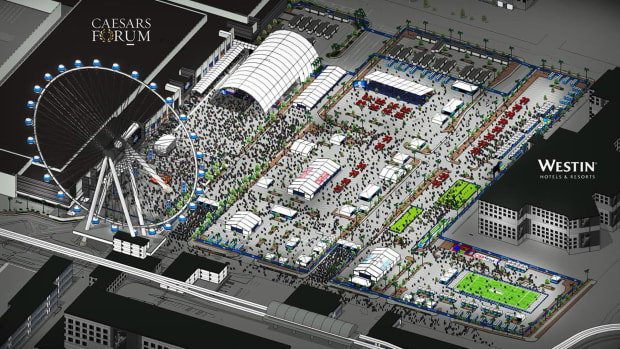Las Vegas has become the sports capital of the United States. It's not that it has the history or championship pedigree of New York, Los Angeles, or Boston, but Sin City has become the most desirable location for major events.
That's not based on the size of the market or the quality of the local fans, it's because Las Vegas has quickly become the go-to destination for major events. No other city has the range of world-class hotels and restaurants clustered in 4.2 miles -- with many of the key Caesars Entertainment (CZR), MGM Resorts International (MGM), and Wynn Resorts (WYNN) properties much closer to each other than that.
Las Vegas is a city that can host the National Football League Draft and actually make that event bigger. It's home to the biggest Ultimate Fighting Championship events and hosts many of boxing's premiere events. Las Vegas has even become a key pay-per-view home for both World Wrestling Entertainment (WWE) and its fast-growing rival All Elite Wrestling.
There's simply no bigger place to stage a sporting event and that's why the National Hockey League expansion team Golden Knights and the NFL's former Oakland Raiders have become major players in their leagues. You don't need to draw a crowd to Las Vegas, crowds come their anyway.
That's why every major sport wants a presence in Las Vegas with Major League Baseball's Oakland Athletics heavily flirting with the city and multiple projects being in the works to build a National Basketball Association arena on the Las Vegas Strip.

Caesars Entertainment
The NBA and Las Vegas Seems Inevitable
Once the Supreme Court made sports betting a state-by-state decision, Las Vegas stopped being a place where no pro team could go due to it being unique in offering legal sports books. The NHL was quick to take advantage with an expansion team while the Raiders moving always seemed just a question of when as the team has a cash-strapped owner and it played in an outdated stadium in Oakland.
The Athletics are in the same situation where the team has been publicly negotiating with Oakland, but it seems destined for Las Vegas. That's because the city pretty much guarantees sell-outs, corporate box sales, all-star games, and lots of other ways to make money.
With the NBA, however, there's one major difference. There's no clear team looking for a new home (Oakland doesn't have a basketball team) and Las Vegas is not the only city looking for a team. Seattle, which once was home to the Supersonics, has become an incredibly attractive option for an expansion team or an existing team to move to because of all the tech money located in that area.
Because of that, it actually seems like the NBA might be smart to consider expanding by two teams. That's certainly a possibility as is a team in a small market moving, but NBA Commissioner Adam Silver made it very clear in an exclusive interview with the Las Vegas Review-Journal that the league has its eyes on Las Vegas.
What's Next for the NBA and Las Vegas?
The NBA already uses Las Vegas as home for its summer league -- a sort of exhibition season for rookies and second-year players. That's why Silver was in town so he could talk to the paper about how the league sees Sin City.
Silver did make it clear that no formal expansion talks were underway, but he did note that one of the things which might have held back Las Vegas -- the size of the market -- may no longer be a problem.
"Maybe the size of local markets become less relevant than they did historically,” he told the Review-Journal. “Vegas has a huge footprint, but from a conventional standpoint, in terms of the number of TVs in households is a relatively small market.”
An expansion team would be entitled to a share of the league's national television contract, but adding a team in Las Vegas would not make that deal any more valuable. That's a factor for owners to consider when setting the fee for an expansion team. A new Las Vegas team may pay $2 billion to enter the league, which would be split by the 30 existing owners, but it would then get a share of national TV revenues which are currently $2.4 billion annually.
That number could double or even triple with the next TV deal which would start in 2024. Because of that, the NBA won't make a decision on Las Vegas until its next TV deal gets locked in.
“How we divvy up our (media) rights going forward will impact the value of a franchise here (Las Vegas) as well,” Silver said. “So, for all those reasons we’re just not going to engage at this moment.”







